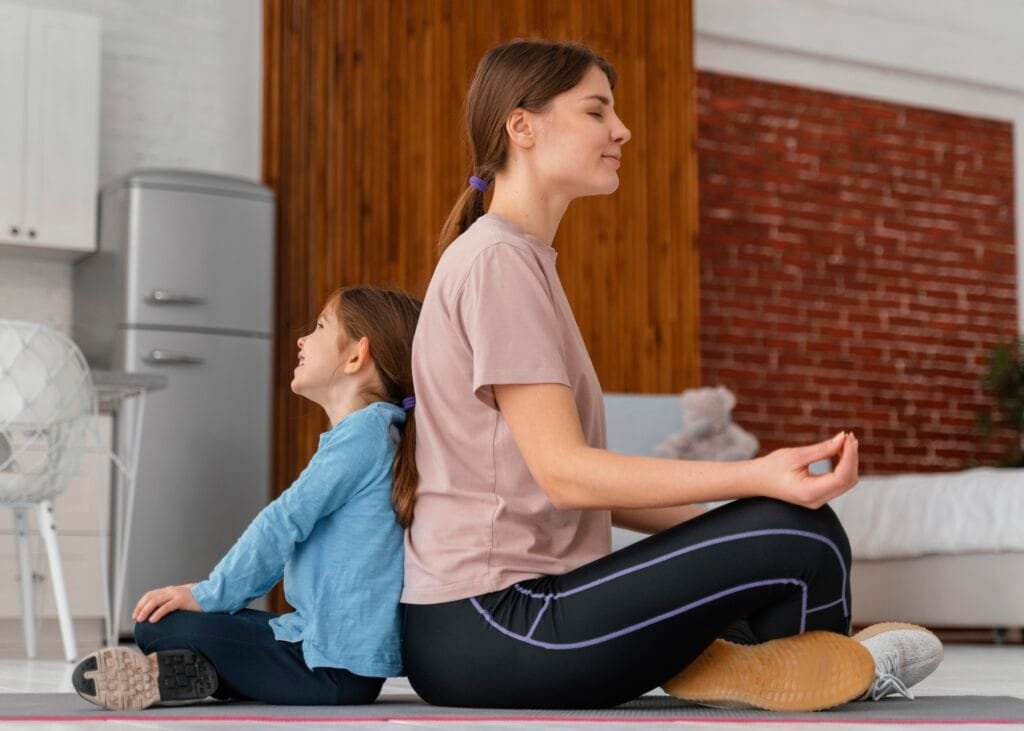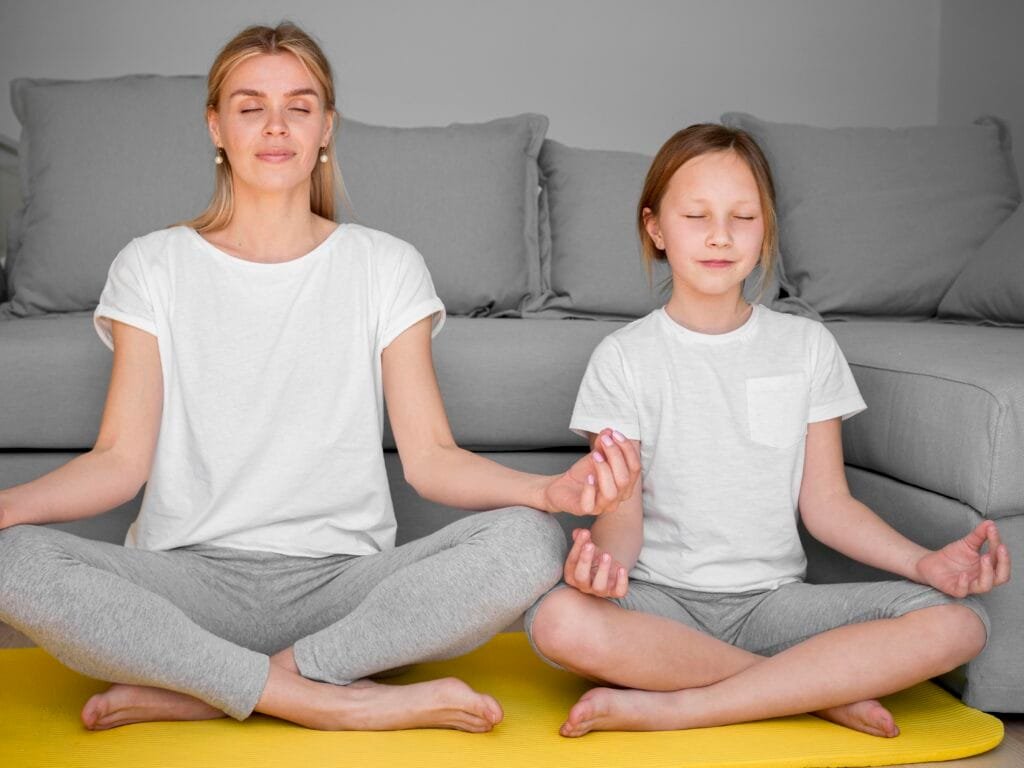Are you a stressed out mom struggling to keep it together?
As a busy working mother, the daily grind of juggling work deadlines, packing lunches, shuttling kids to activities, and trying to find a shred of “me time” can leave you feeling totally depleted. Parent burnout is real – but practicing mindfulness can help you find your center again.
Interesting Fact: Studies show mindfulness reduces stress and improves wellbeing in parents. One study found that a mindfulness program decreased stress, anxiety and depression in parents of preschoolers.

Signs You’re Experiencing Parent Burnout
Burnout creeps up on you gradually. It’s a state of physical, mental and emotional exhaustion caused by prolonged stress. Watch for these warning signs that you’re running on empty:
- Feeling irritable and impatient with your kids. Snapping at your children over minor things strains your relationship, leaving everyone feeling awful. You may struggle to enjoy time with your kids.
- Physical and mental exhaustion. Constant fatigue makes it hard to be the patient, energetic parent you want to be. You may get sick more often as stress weakens your immune system.
- Loss of enjoyment in parenting. The things you used to love about parenting, like playing with your kids or watching their milestones, may feel like joyless chores. This can lead to guilt and disconnection.
- Withdrawing from family and friends. Isolating yourself deprives you of vital support and may worsen feelings of overwhelm. Relationships with loved ones may suffer.
- Neglecting self-care. Skipping meals, exercise, sleep, and hobbies you enjoy signals you’re at the bottom of your own priority list. This intensifies burnout and models poor self-care to your kids.
Which of these burnout signs resonates most with you? Acknowledging your burnout is the first step to addressing it.
Sound familiar? Your inner critic may whisper that you’re failing as a parent. But burnout doesn’t mean you’re a bad mom – it means you need to pause and recharge. With mindfulness, you can turn down the volume on that critical inner voice.
How Mindfulness Helps Parent Burnout
Mindfulness is the practice of being fully present in the moment with openness and curiosity. For overwhelmed parents, it’s a powerful tool to:
- Reduce stress and anxiety. Focusing on the present stops the spiral of worries about the past or future. Mindful breathing activates the parasympathetic nervous system, your body’s “brake pedal” for stress.
- Improve patience and emotional regulation. Noticing your emotions with mindful awareness creates space between trigger and reaction, allowing you to respond calmly and constructively, even in tense parenting moments.
- Increase self-compassion. Mindfulness helps you notice harsh self-judgments and treat yourself with more kindness. A self-compassionate inner voice is an antidote to parent guilt.
- Boost mood and energy levels. Mindfulness practices like yoga and meditation uplift your mental state and give you more fuel to tackle the day with patience and presence.
- Find meaning and joy in parenting again. Mindful awareness helps you notice the magical moments of connection and growth with your child that get lost in the daily rush. Savoring these strengthens your parent-child bond.
“Mindfulness is the aware, balanced acceptance of the present experience.” – Sylvia Boorstein

Mindfulness won’t magically erase the challenges of parenting. But it creates space between you and your stressors, allowing you to respond rather than react. With practice, mindfulness builds resilience to weather the ups and downs of parenthood.
5 Mindful Practices to Ease Parent Burnout
Weave these simple yet impactful mindfulness practices into your day to soothe burnout and rediscover the beauty in parenthood:
- Take mindful breaks. How to – Set a reminder to pause for a few deep breaths throughout your day. Notice any tension in your body and consciously relax. Benefit – mini-mindfulness breaks interrupt the stress cycle and bring you back to calm and equilibrium.
- Practice gratitude. How to – Write down three things you’re grateful for each day, even if it’s just a hot cup of coffee or a child’s smile. Share your gratitude with your kids. Benefit – Gratitude shifts your focus to the positive, increases optimism and self-esteem. Modeling gratitude also boosts your kids’ wellbeing.
- Do a body scan. How to – Lie down and mentally scan your body from head to toe, observing any sensations without judgment. Breathe into tense areas. Benefit – Body scans promote full-body relaxation, strengthen mind-body awareness, and teach you to befriend (rather than battle) uncomfortable sensations.
- Mindfully connect with your kids. How to – Put away distractions and give your child your full attention, even just for five minutes. Listen, play, or snuggle together. Benefit – Mindful, positive attention nourishes your parent-child bond and helps your child feel seen and secure. It takes your relationship from transactional to transformational.
- Prioritize self-care. How to – Mindfully savor a favorite hobby, chat with a friend, take a nap, or anything that recharges you. Schedule it and treat it as non-negotiable.
Benefit – Self-care prevents and soothes burnout by attending to your needs and bringing more balance and joy into your life. It also sets a powerful example of self-worth for your kids.
“Almost everything will work again if you unplug it for a few minutes, including you.” – Anne Lamott
Interesting Fact: Even a 5-minute mindfulness practice can lower stress and blood pressure. The more you practice, the easier it becomes to drop into mindfulness during difficult parenting moments.

Your inner critic may scoff at taking time for yourself. It says self-care is selfish when your family needs you. But remember – mindfulness makes you a calmer, more patient and present parent. Pushing through burnout doesn’t make you a hero, it makes you depleted and resentful.
Practical Advice: Start small with just a few minutes of mindfulness per day. Consistency is more important than lengthy sessions. Set yourself up for success by anchoring a new habit to an existing one, like practicing deep breathing while your coffee brews. Make it a family affair by inviting your kids to join you for some practices.
Which of these practices speaks to you most? What obstacles might arise in implementing them and how might you overcome those? Identifying your path of least resistance to mindfulness sets you up for success.
You are the heart of your family. By mindfully attending to your own well-being, you’ll have more to give to your kids. Be patient as you build your mindfulness muscle. With time, you’ll feel more calm, centered, and connected – to yourself and your children.
Mindfulness is a lifeline for parents on the edge of burnout
Burnout doesn’t have to be the price of parenthood. By integrating simple mindfulness practices into your life, you’ll rediscover the joy and meaning beneath the daily stressors of raising a family. As you become more patient and present with yourself, you’ll grow your capacity to be the parent you want to be.
Imagine yourself as the mindful parent you aspire to be. What would that look and feel like? What would be possible for you and your family? Let that vision guide and motivate you.
Remember, mindfulness is a practice, not a destination. It’s not about getting it perfect, but about showing up again and again with curiosity and compassion. Each small step you take toward mindful parenting is a powerful act of love for yourself and your family.

Ready to experience the benefits of mindfulness? Book an individual online session to get personalized strategies and support for your mindful parenting journey. With a little practice, you’ll strengthen your inner calm and rediscover the magic of parenthood, one moment at a time. Let’s walk this path together.




